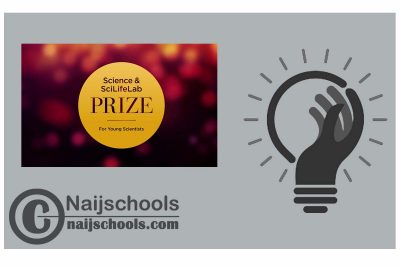This informs the public about the Science & SciLifeLab Prize for Young Scientists 2024. Details about the Program are given below.
The prize is awarded annually to one young scientist for outstanding life science research for which they were awarded a doctoral degree in the previous two years.
Program Details
The topic of the entrant’s thesis research must be in one of the following categories: Cell and Molecular Biology; Genomics, Proteomics, and Systems Biology approaches; Ecology and Environment; Molecular Medicine.
Eligible entrants must have been awarded their doctoral degree in 2022 or 2023, and the subject of their thesis should match one of the Subject Tracks below. The winners from each category will compete for the grand prize.
Prize money: USD 30,000 for the grand prize winner, USD 10,000 for each of the category winners. All federal, state and local taxes, as well as any other costs and expenses associated with the receipt or use of the prize, are the sole responsibility of the winner.
Publication: The grand prize-winning essay will be published in Science, and essays from each of the category winners will be published online.
Eligibility
- The research described in the entrant’s thesis must fall within one of the following categories (Subject Tracks):
- Cell and Molecular Biology: Research in this category includes cellular and molecular processes at levels ranging from single molecule to single cell to tissue and organ systems.
- Genomics, Proteomics and Systems Biology approaches: Research in this category focuses on genomics, proteomics, integrative omics and systems biology approaches, including computational, to facilitate comprehensive understanding of living cells, organisms and species.
- Ecology and Environment: Research in this category encompasses interactions between organisms and their environment and how these processes are influenced by human activity.
- Molecular Medicine: Research in this category aims at building on the molecular understanding of disease in humans to develop preventive, diagnostic, and therapeutic approaches, including individualized medicine.
- Text generated from AI, machine learning, or similar algorithmic tools cannot be used to generate the submission nor its accompanying figures, images, or graphics. Limited editing with tools such as Grammarly is acceptable but must be declared. During submission, entrants will be required to declare they have not used AI that is inconsistent with this requirement. Entrants are accountable for the accuracy of the entry and for ensuring that there is no plagiarism. They must also ensure that all sources are appropriately cited and should carefully review the work to guard against bias that may be introduced by AI. Editors may decline to consider an entry if AI is used inappropriately.
- The prize will only recognize work that was performed while the entrant was a graduate student.
- The prize will be awarded without regard to sex, race, or nationality.
- An entrant may not win more than one Science Prize using the same essay or a similar essay on the same research.
- Essays on the same research cannot win more than one Science Prize, regardless of who the entrant is.
- Past winners of a Science Prize cannot be eligible for another Science Prize until at least 5 years have passed since the award. For a full list of Science Prizes, please see here.
- While the research may be part of a larger team effort, for the purposes of this Prize, an eligible entrant must be a single individual, and the essay must focus on their contribution.
- Employees of Science/AAAS, collaborators in the management or sponsorship of this prize and their relatives, as well as the following, are not eligible to enter:
- Scientists who were PhD students in the groups of any past or present member of the SciLifeLab management group (SciLifeLab Director, Co-Director, Infrastructure Director and Scientific Directors), the Integration Directors, or any member of the SciLifeLab Board.
- Entrants for the 2024 prize must have been awarded their PhD between 1 January 2022 and 31 December 2023. As a rule, we will only accept submissions once within this time period.
How to Apply
Application Deadline
- The deadline for receipt of applications is 15 July 2024.
Open this link for more details about the Science & SciLifeLab Prize for Young Scientists 2024, or email SciLifeLabPrize@aaas.org.
Check Out:
- St Andrews Prize for the Environment 2024
- World Food Prize Nomination Criteria 2025
- Orange Social Venture Prize in Africa and the Middle East 2024

